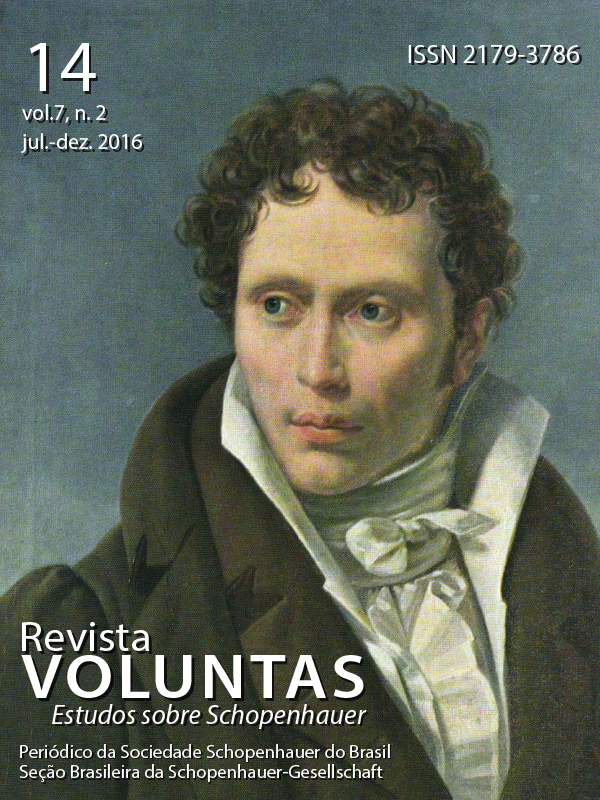A kantian answer to the critics practiced by Schopenhauer against the terms "purpose in itself", "absolute value" and "dignity"
DOI:
https://doi.org/10.5902/2179378633707Keywords:
Kant, Schopenhauer, Zweck an sich selbst, Absoluter Wert, Würde des MenschenAbstract
This article aims to discuss the criticisms made by Schopenhauer against the Kantian terms “purpose in themselves”, “absolute value” and “human dignity” with the intention of writing a possible Kantian answer. With regard to such reviews, we will look at his article on the basis of morality, especially its eighth section. In his opinion, such three terms are "thoughts" that make no sense. Against Schopenhauer's claims, it is possible to give a Kantian answer: First, with regard to a meaning of the words "purpose" and "value" that Schopenhauer did not pay attention to, which will allow us to think both terms correctly in the Kantian sense and to understand; secondly, that such a consideration of both terms will also allow the concept of dignity to be understood as no contradictio in adjecto; and thirdly, that the two previous points show that Schopenhauer's criticisms noted here are ineffective against the Kantian moral philosophy.Downloads
References
CARTWRIGHT, David E. “Schopenhauer's Narrower Sense of Morality”. In: JANAWAY, Christopher (Ed.). The Cambridge Companion to Schopenhauer. Cambridge: Cambridge University Press, 1999.
KANT, Immanuel. Werke in zwölf Bänden. Herausgegeben von Wilhelm Weischedel. Frankfurt: Suhrkamp, 1991.
KLEMME, Heiner F. „,die vernünftige Natur existirt als Zweck an sich selbst‘: Überlegungen zu Oliver Sensens Interpretation der Menschheitsformel in der Grundlegung zur Metaphysik der Sitten“. In: Kant-Studien, Bd. 106. Berlin: De Gruyter, 2015.
KORSGAARD, C. M. Creating the Kingdom of Ends. Cambridge: Cambridge University Press, 1996.
KORSGAARD, C. M. The Sources of Normativity. O. O'Neill (Ed.). Cambridge: Cambridge University Press, 1996.
KORSGAARD, C. M. “Valuing Our Humanity”. In: Respect for Persons. Ed. Oliver Sensen and
Richard Dean (forthcoming).
PAVÃO, Aguinaldo. “Imperativo categórico e egoísmo: observações sobre a crítica de Schopenhauer a Kant”. Revista de Filosofia: Aurora, Curitiba, v. 24, 2012.
PAVÃO, Aguinaldo. “Kant e Schopenhauer sobre a natureza da filosofia moral”. Dissertatio, Pelotas, v. 30, pp. 135-148, 2009.
SCHOPENHAUER, Arthur. Über die Grundlage der Moral. Mit einer Einleitung, Anmerkungen und einem Register herausgegeben von Peter Welsen. Hamburg: Felix Meiner Verlag, 2007.
SENSEN, Oliver. Kant on Human Dignity. De Gruyter: Berlin/Boston, 2011.
SENSEN, Oliver. “Kant on Human Dignity reconsidered”. In: Kant-Studien. Bd. 106. Berlin: De Gruyter, 2015.
STOBBE, Emanuel Lanzini. “Análise do direito pessoal de caráter real partindo do conceito de dignidade na filosofia moral de Kant”. In: Revista Enciclopédia, Pelotas, v. 3, Inverno de 2015, pp. 101-114, 2015.
STOBBE, Emanuel Lanzini. A natureza racional como fim em si mesmo: an|lise e discussão sobre o conceito kantiano de “fim em si mesmo” na Fórmula da Humanidade. 2016. 96 S. Abschlussarbeit (Philosophie) – Universidade Estadual de Londrina, Londrina, 2016.
Downloads
Published
How to Cite
Issue
Section
License
The submission of original manuscripts to this journal implies the transference, by the authors, of the copyrights for printed and digital publication. The copyrights of a published manuscript belong ultimately to the author, and only the copyright for its first publication is reserved to the journal. Authors may only use the same results in other publications explicitly indicating this journal as the medium of the original publication.
Licence
Attribution-NonCommercial-ShareAlike 4.0 International (CC BY-NC-SA 4.0) - This license lets others remix, tweak, and build upon your work non-commercially, as long as they credit you and license their new creations under the identical terms.






